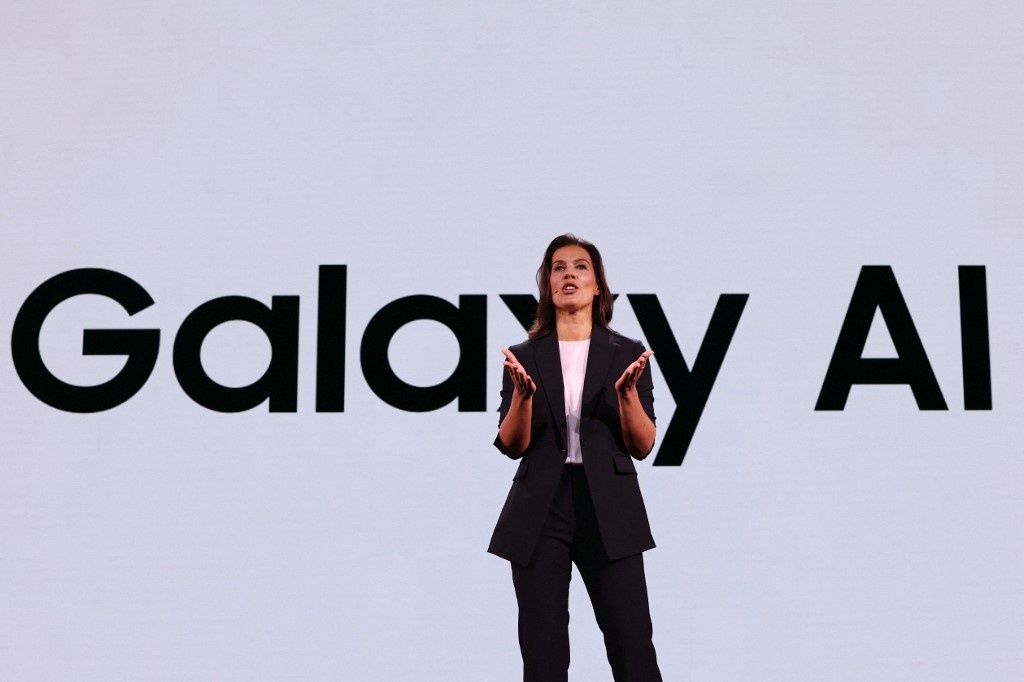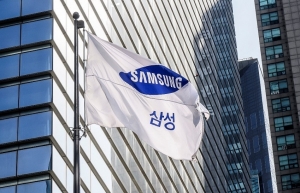Samsung showcases AI despite strike woes
At a presentation in Paris on Wednesday, company executives declined to discuss the failed negotiations that saw workers extend a three-day strike indefinitely.
In January, Samsung unveiled the integration of AI applications baptised Galaxy AI into its flagship S24 smartphone.
 |
| Vice President Geminin User Experience and Google Jenny Blackburn speaks during the Samsung Galaxy Unpacked event to unveil the next generation of Artificial Intelligent (AI) powered Galaxy phones at the Carrousel du Louvre shopping mall in Paris on July 10, 2024. EMMANUEL DUNAND / AFP |
On Wednesday, Samsung announced plans to roll out AI applications to all of its consumer products, from wireless headphones to smartwatches to connected rings.
The head of Samsung's mobile unit, TM Roh, said their initial objective had been to bring Galaxy AI to 100 million devices by the end of this year.
"The progress has been accelerated, so at this point we can say that within this year Galaxy AI will be available on 200 million devices," he said.
From generative AI capabilities to writing texts from brief instructions to simultaneous translation of phone conversations, tech industry titans are in a frantic race to deploy AI technology into smartphones and other consumer products.
Roh said Samsung's mobile unit has invested more than one billion dollars on AI, and overall the company has spent much more.
"While Samsung prepared the ground well with its 'Galaxy AI' marketing, AI services are still limited and it isn't yet an essential element in choosing a smartphone but simply a means to demonstrate the capacity to innovate," said Thomas Husson, an analyst at tech research and consulting firm Forrester.
He noted that Samsung's smartphone rival Apple, which last month unveiled its AI initiative called Apple Intelligence, doesn't have the means to fully realise its ambitions and must still rely on its partnership with Chat-GPT maker OpenAI, with its actions constrained by EU regulations.
After being dethroned as the top smartphone maker by Apple in 2023, Samsung reclaimed the crown in the first quarter of this year with more than 60 million devices sold and a nearly 21 percent market share, according to tech research firm IDC.
While that was a 0.7 percent drop in unit sales from the same period in 2023, Apple suffered a 9.6 percent drop to more than 50 million iPhones sold, leaving it with a 17.3 percent market share.
Samsung's smartphone strategy is to focus on AI and the premium end of the market, and Wednesday it unveiled the sixth generation of its folding phones.
It also plans to diversify into health-related products and it announced Wednesday that it would begin selling its Galaxy Ring July 24 in a limited number of markets including Britain, China, France, Germany, South Korea and the United States.
Unveiled in January, the sensors on the ring allow wearers to collect precise information about their heart rate and sleep quality, and monitor the data from their Samsung phones.
 | Samsung union says will strike after talks breakdown A union representing tens of thousands of workers at South Korean tech giant Samsung Electronics told AFP on Tuesday it would hold a three-day strike later this month after negotiations failed. |
| PM visits Samsung’s semiconductor cluster in RoK’s Gyeonggi province Prime Minister Pham Minh Chinh and his entourage on July 3 visited Samsung's semiconductor cluster in Gyeonggi province as part of his official visit to the Republic of Korea (RoK). |
What the stars mean:
★ Poor ★ ★ Promising ★★★ Good ★★★★ Very good ★★★★★ Exceptional
Related Contents
Latest News
More News
- Masan Consumer names new deputy CEO to drive foods and beverages growth (February 23, 2026 | 20:52)
- Myriad risks ahead, but ones Vietnam can confront (February 20, 2026 | 15:02)
- Vietnam making the leap into AI and semiconductors (February 20, 2026 | 09:37)
- Funding must be activated for semiconductor success (February 20, 2026 | 09:20)
- Resilience as new benchmark for smarter infrastructure (February 19, 2026 | 20:35)
- A golden time to shine within ASEAN (February 19, 2026 | 20:22)
- Vietnam’s pivotal year for advancing sustainability (February 19, 2026 | 08:44)
- Strengthening the core role of industry and trade (February 19, 2026 | 08:35)
- Future orientations for healthcare improvements (February 19, 2026 | 08:29)
- Infrastructure orientations suitable for a new chapter (February 19, 2026 | 08:15)

 Tag:
Tag:


















 Mobile Version
Mobile Version